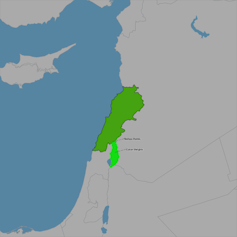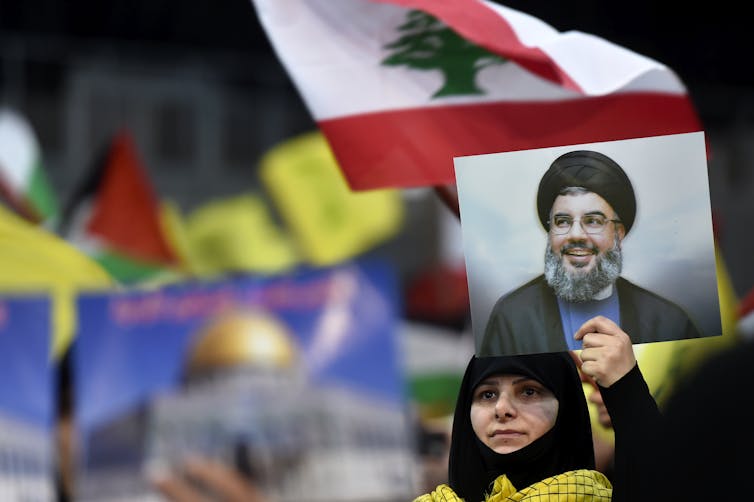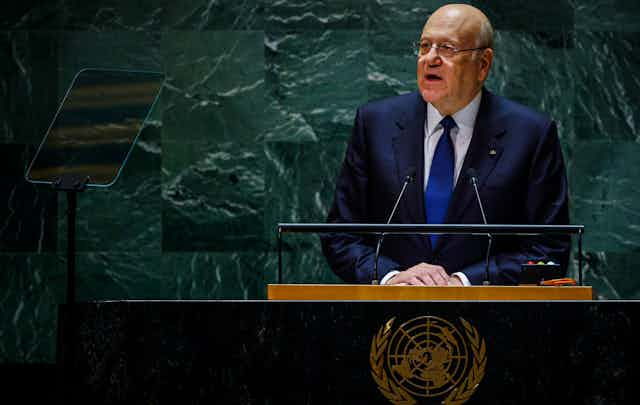As the Lebanese prime minister, Najib Mikati, outlined a three-step peace plan for the conflict in Gaza on October 31, he made a statement which may seem ordinary to a western audience: “We will consider the right of Israel and the right of the Palestinians.”
But his words had the potential to spark outrage in a country that has yet to recognise Israel, let alone entertain the idea of peace talks.
Speaking to The Economist, Mikati outlined his initiative. His plan calls for a five-day ceasefire followed by a permanent cessation of hostilities.
Then, an international conference should convene to finally resolve the issue by implementing the ever-elusive two-state solution.
Read more: Oslo accords: 30 years on, the dream of a two-state solution seems further away than ever
There is no doubt that Mikati’s plan expresses the more moderate wishes of the majority in the Middle East. Most people not directly involved in the conflict want to see an immediate end to what is widely seen as a disproportionate and collective punishment of Gaza. They also want an increase in international diplomatic efforts to tackle the underlying issues.
It’s clear that many in the Arab world don’t consider the attacks on October 7 as isolated incidents. And that some responsibility should be shared by Israel and the west, who they consider to have failed to seriously pursue the two-state solution, at the expense of Palestinian dignity and political expression.
Yet Mikati’s plan itself is hardly original. It echoes the Arab peace initiative called for by the much more influential Saudi Arabia in 2002.
So why is a caretaker prime minister (only a president, which Lebanon has not had for two years, can appoint a prime minister) spearheading a seemingly hopeless peace plan, when his country has yet to settle its own matters with Israel?
No appetite for war
The first and immediate reason for Mikati’s initiative is the rising worry in Lebanon that the country will be dragged into a war it simply cannot afford to participate in.
The Lebanese state has been effectively bankrupt since 2019, and the country has been mired with one crisis after another ever since. Its economy has contracted by 39.9% of GDP since 2018 while the Lebanese Pound has lost more than 98% of its value in that time, according to World Bank estimates.
Meanwhile, average inflation in 2022 reached 171%) and the government dept-to-GDP ratio was listed at 283.2%.
This financial hole, compounded by the extraordinary explosion at Beirut’s port in August 2020 and subsequent energy and wheat crises, has left Lebanon in one of the worst socioeconomic situations in the country’s history. So, it’s hardly surprising that the appetite for war is not exactly surging.
Read more: How Beirut's port explosion exacerbates Lebanon's economic crisis
The second impetus for Mikati is political. Lebanon has always had a peculiar position within the Arab-Israeli conflict. Parts of the country see it as an existential issue amid fears of Israeli aggression, while others have developed a more ambivalent attitude.
Since a brief involvement in the Arab war against Israel in 1948, the Lebanese military has avoided getting involved in any military action against Israel.
Hezbollah’s success in pushing Israel out of the south of Lebanon in 2000 and its brief campaign against Israel in 2006 have led many to associate the Iran-sponsored “Party of God” with resistance against Israel. Meanwhile, many Lebanese leaders have done their best to distance themselves from Hezbollah, and the military has played a minimal role in stopping Israeli encroachments and attacks on Lebanese infrastructure.

Hezbollah continues to gain much of its legitimacy in Lebanon as a resistance movement, often using as an official raison d’être Israel’s continued occupation of the Shebaa Farms. This is a small area of 16 square miles claimed by Lebanon that contains a few settlements. It sits on Lebanon’s border with Syria, which also runs through the Israeli-occupied Golan Heights.
A 2022 survey conducted by the Arab Barometer showed that 17% of respondents in Lebanon said they “strongly favour or favour” normalisation between Arab states and Israel.
This ranked Lebanon third among countries surveyed. And the two above it, Sudan (39%) and Morocco (31%), are both parties to the controversial Abraham Accords, the bilateral agreements signed in 2020 and 2021 between Israel and various Arab states. For comparison, only 5% of Egyptians and Jordanians responded in the same manner.
Even for those Lebanese that are more openly aggressive to Israel, it seems that certain engagement rules (including restricting attacks to military outposts and surveillance equipment, and refraining from targeting civilians) – developed over the years between Hezbollah and the Israeli military – have served to bring a more satisfactory status quo.

In fact, another survey conducted this week by Lebanese newspaper Al Akhbar – which is often seen as supportive of Hezbollah – showed that 68% of respondents are against direct engagement, while only 52% supported limited “operations” to keep pressure on Israeli forces.
Anger at Israel
That said, one shouldn’t confuse a lack of appetite for war with support, or even tolerance, of Israeli internal and regional activity, not least in the latest conflict with Hamas. Protests have been taking place across Lebanon and the wider region over the past couple of weeks expressing solidarity with Palestinians, while also condemning the west’s seemingly unconditional support of Israel.
What’s more, 80% of respondents in Al Akhbar’s survey expressed support for Hamas’s operations and 73% were against a neutral Lebanese position in the conflict. This chimes with the views of many others in the Arab world and across a range of developing countries, that Israel is either a guilty party or has gone too far in its retaliation in Gaza.
Such are the delicate balances that Mikati is trying to hold with his new initiative for peace. While his plan will likely fall on deaf ears, the rest of Lebanon will be watching with bated breath as the country’s (and the region’s) fate plays out over coming weeks and months.

